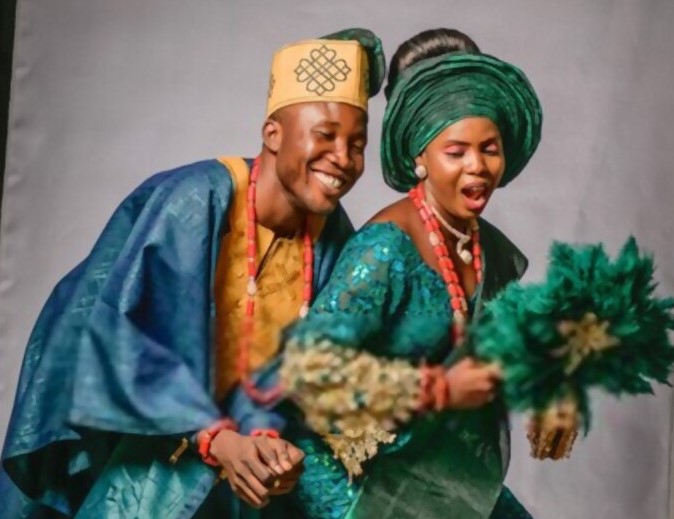Weddings are a big deal in this part of the world. They are the whole package: glamorous, colourful, fun, and memorable. On this special day, couples officiate their relationships and take a huge step toward a lifetime commitment.
Traditional marriages are mostly done before the church wedding (if there is any). So, most Nigerian couples usually have two weddings. Ghen Ghen!
Depending on the tribe, the process and procedure for traditional marriages vary. So, we will look into traditional marriages in Nigeria with respect to their tribes.
Table of Contents
Traditional Marriages in Nigeria Based on Tribes
-
Igbo marriages
Igbo traditional marriages are extravagant. They spend heavily on eating, drinking, and dressing.
Before the main ceremony, the groom’s family would first ‘knock’ on the bride’s house door with food and gifts to officially ask for the bride’s hand in marriage.
The bride’s family then gives the groom a list that comprises different items which would be used to pay her bride price. This is symbolic in showing that the groom can care for their daughter. Odogwu 1! After this, they pick a date and start making preparations.
On D-day, the bride is adorned with the Igbo traditional attire that can be sewn into a wrapper, blouse, or any other style the bride prefers. She also sometimes uses a matching head tie or decks her perfectly styled hair with beautiful ornaments and beads. Her neck, wrists, and ankles are included in the decking process, as beads in different sizes complement them.
On the other hand, the groom wears the Isi-agu shirt, with either a pair of trousers or a wrapper, depending on the groom’s preference.
During the ceremony, the groom’s family pays the Bride’s price in cash and kind. Then, the bride looks for her husband sitting in the crowd while dancing with a cup of palm wine. When she finds him, she gives him the wine to drink. When he does, he puts money in the cup, and they proceed to receive blessings from parents and elderly ones present.
After that, they are joined and dance together as husband and wife, with family members spraying them in different denominations. The event includes more than enough locally made dishes, and the party jollof isn’t excluded. Surplus drinks are also available with music and dance that continues for as long as they can keep up.
Read also: 10 Ways to Know a True Wife Material
-
Hausa marriages
Hausa traditional marriages are simple but elegant.
Like other tribes, the groom also goes to the bride’s home with fruits and gifts to seek the bride’s hand in marriage.
After the approval, the groom pays the bride price (which isn’t expensive based on their Islamic beliefs), and a date is set for the wedding. For the wedding reception, the bride’s friends organize a bridal shower to prepare the bride. They rub perfumes and scented flowers on the bride and apply traditional tattoos (henna) on her hands and feet.
Then, they dress her in fashionable and modest attires, use subtle make-up, and complement them with expensive jewellery.
During the wedding reception, they exchange vows and rings, receive blessings from the Islamic Priest, and the party begins. There are usually locally made dishes, music, and dance to celebrate the union.
Have you ever had experience of any of these marriages? We will love you to share your experience with us on our Whatsapp Community.
-
Yoruba marriages
The Introduction is the first phase of a Yoruba marriage, and this is when family members of the bride and groom get to know each other in a small ceremony.
In this ceremony, they pick a date for the engagement and give the groom the list of items to be brought as gifts for the bride and her family, which would be presented at the engagement party.
The Engagement Party is like a reunion for distant family members, and it is the traditional official joining.
There, you would find family members from both sides, including aunties who bathed the bride while she was a baby and uncles who picked the groom up from primary school. Both bride and groom are always expected to recognize each these family members.
Uniformity is seen in the dressings of different groups like the bride’s family, the bride’s friends, the groom’s family, the groom’s friends, and the parent’s friends.
The bride stands out in her lace or aso-ofi material alongside a gentle. The groom is also dressed in an agbada and fila.
During the engagement ceremony, they pay the bride’s price and present the gifts. The groom dances in first, prostrates for the bride’s family, and waits for his bride. The bride also dances in, kneels to greet and show respect to the family, and joins her husband.
The Alaga (MC) infuses different songs and slang to make the ceremony fun and is mostly accompanied by an assistant and drummer.
There is usually enough food and drinks to eat at the venue and take home (if you play your cards right). Souvenirs in different sizes, shapes, and forms are also shared with guests. The music can be from a live band, DJ, or both, bringing all the ginger and energy needed for a bubbling occasion.
In the end, beautiful memories are created, and everyone looks forward to attending another wedding ceremony of its kind.
Read also:Owambe Party in Nigeria: Foods, Vibes, Dressing and Cruise
What makes Traditional Marriages Stand out
Looking at these diverse tribes and how they organize and conduct their marriage, a few things make them stand out from a church wedding.
-
Coordinated outfits
These can be either lace, ankara prints, or george material. Aso-ebi (uniform) for family, friends, and well-wishers is a must, adding colour to the occasion.
-
Abundant food and drinks
A party without these two in excess is just a meeting. Let’s remember the reputable party jollof that represents a proper naija wedding.
-
Music
Either a live band or a DJ. Sweet jams have to pilot the whole process.
-
Spraying money
The energy that comes as different denominations is placed on you as you move your body to the rhythm of the music. That’s a sweet feeling and a smooth way to make money while flexing.
-
Branded souvenir
How else would they know you went to a party if you don’t have a bowl, cup, plate, towel, hand fan, etc., that says;
Simi weds Kunle
Date: 6th of October, 2023
Courtesy: Family
-
Upheld tradition
Almost every step taken in these marriages has a traditional backing that shows the preservation of cultural beliefs.
Conclusion
There’s no party like a traditional Nigerian marriage, from all the glitz to the glamour and all that comes with it. And we’re sure this article has proven that. Be sure to attend one soon.
You love this? You can also subscribe to our newsletter to keep track of more engaging posts.
Edited by Emmanuel Odebiyi
About Author
- I am a student of Obafemi Awolowo University. A Gen-Z and advocate for the Soft Life. I spend most of my leisure time as a freelancer, creatively curating content and telling relatable stories. I am also passionate about quality lifestyle.
Latest entries
 SpiceDecember 11, 20237 Board Games Among Nigerians That Will Never Get Old
SpiceDecember 11, 20237 Board Games Among Nigerians That Will Never Get Old SpiceNovember 30, 2023How to Spot Fake News and Its Effect
SpiceNovember 30, 2023How to Spot Fake News and Its Effect LifestyleOctober 16, 2023Markets in Lagos and What You Need to Know About Them
LifestyleOctober 16, 2023Markets in Lagos and What You Need to Know About Them LifestyleSeptember 8, 20239 Must-visit Travel Destinations in Nigeria
LifestyleSeptember 8, 20239 Must-visit Travel Destinations in Nigeria

